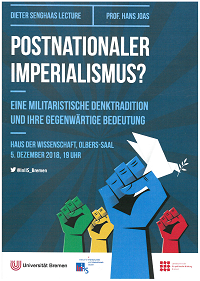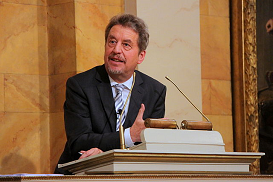Dieter-Senghaas-Lectures
With its annual lecture series on European and world political developments, crises and conflicts, the Institute for Intercultural and International Studies pays tribute to its Senior Fellow Prof. Dr. Dr. h.c. Dieter Senghaas, who is not only one of the founding fathers of the Institute, but also one of the most internationally renowned and renowned peace and conflict researchers. In 2015, the lecture series was opened by Prof. Klaus Dieter Wolf, Executive Member of the Board of the Hessian Foundation for Peace and Conflict Research, in the historic "Stadtwaage".
2021: Kriege beenden - aber wie? Verhandlungen, Dialog, Mediation und der afghanische Friedensprozess
2019: Prof. Dr. Birgit Mahnkopf: Der Krieg gegen den Planeten und die Perspektiven von Weltordnungspolitik an Kipppunkten der menschlichen Entwicklung
2018: Prof. Dr. Dr. h.c. Hans Joas: Postnationaler Imperialismus? Eine militaristische Denktradition und ihre gegenwärtige Bedeutung
2017: Prof. Dr. Dr. h.c. Gudrun Krämer: Einheit, Vielfalt. Differenz. Vom Umgang mit dem Anderen im zeitgenössischen Islam
 Poster Dieter-Senghaas-Lecture 2018
Poster Dieter-Senghaas-Lecture 2018 Hans Joas, Foto: Von Ziko van Dijk, CC BY-SA 3.0, https://commons.wikimedia.org/w/index.php?curid=36594837
Hans Joas, Foto: Von Ziko van Dijk, CC BY-SA 3.0, https://commons.wikimedia.org/w/index.php?curid=365948372018: Prof. Dr. Dr. h.c. Hans Joas: Postnationaler Imperialismus? Eine militaristische Denktradition und ihre gegenwärtige Bedeutung
On December 5, 2018 the Dieter Senghaas Lecture will take place in the Olbers-Saal at the Haus der Wissenschaft (7 pm). The lecture entitled "Postnational Imperialism? A militaristic tradition of thought and its present meaning" will be held by Prof. Dr. Dr. h.c. Hans Joas.
At the center of this fourth Senghaas Lecture is the European unification process, the legitimacy of which is anchored to a considerable degree in the successful establishment of a stable "post-Hobbesian" peace order after the Second World War. In today's efforts towards a common European defense and security policy, the decisive question therefore arises as to whether this will follow the principles that apply in Europe's internal relations or whether we are witnesses of the emergence of a new world power of an old school manner, i.e. a "post-national imperialism". This question will be explored in the lecture on the way to the present by Otto Hintze and Carl Schmitt in their examination of historical-sociological reflections on Europe.
Hans Joas is Ernst Troeltsch Honorary Professor at the Humboldt University in Berlin. Before that, he was Professor of Sociology at the University of Erlangen-Nuremberg and at the Free University of Berlin. He was professor at the University of Chicago and between 2002 and 2011 director of the Max Weber College for Cultural and Social Studies in Erfurt and until 2014 permanent fellow at the Freiburg Institute of Advanced Studies. He has also received numerous awards, including the Max Planck Research Award (2015), the Alexander von Humboldt Foundation's Werner Heisenberg Medal (2012), and the Bielefeld Science Award (2010).
With this lecture series, the Institute for Intercultural and International Studies (InIIS) and the Landeszentrale für Politische Bildung Bremen are honoring the life and work of one of the most internationally renowned and respected peace and conflict researcher, who has been teaching and researching at the University of Bremen since 1978. In the book "Deutsche Politikwissenschaftler - Werk und Wirkung", edited by Eckhard Jesse and Sebastian Liebold, Dieter Senghaas is characterized as an outstanding scholar who has "shaped an entire generation of people in peace research, in the peace movement and in the developmental 'environment'. And it goes on to say: "Where Senghaas is, there is academy; there is a lively exchange about the changes in the world and about the dynamics inherent in it". With the "civilizing hexagon" he developed, which emphasizes the possibilities of peaceful development in and between societies, he has created a paradigm that has made it into the Abitur tasks of German students and into the most important textbooks of international relations. His book "Zivilisierung wider Willen" ("Civilization Against Will") on the long and difficult process of sustainable peace-building in Europe has been translated into numerous languages, including Chinese, Arabic and Korean. His oeuvre includes 35 books written by him as well as 35 other books in which he was involved as editor or co-author.

